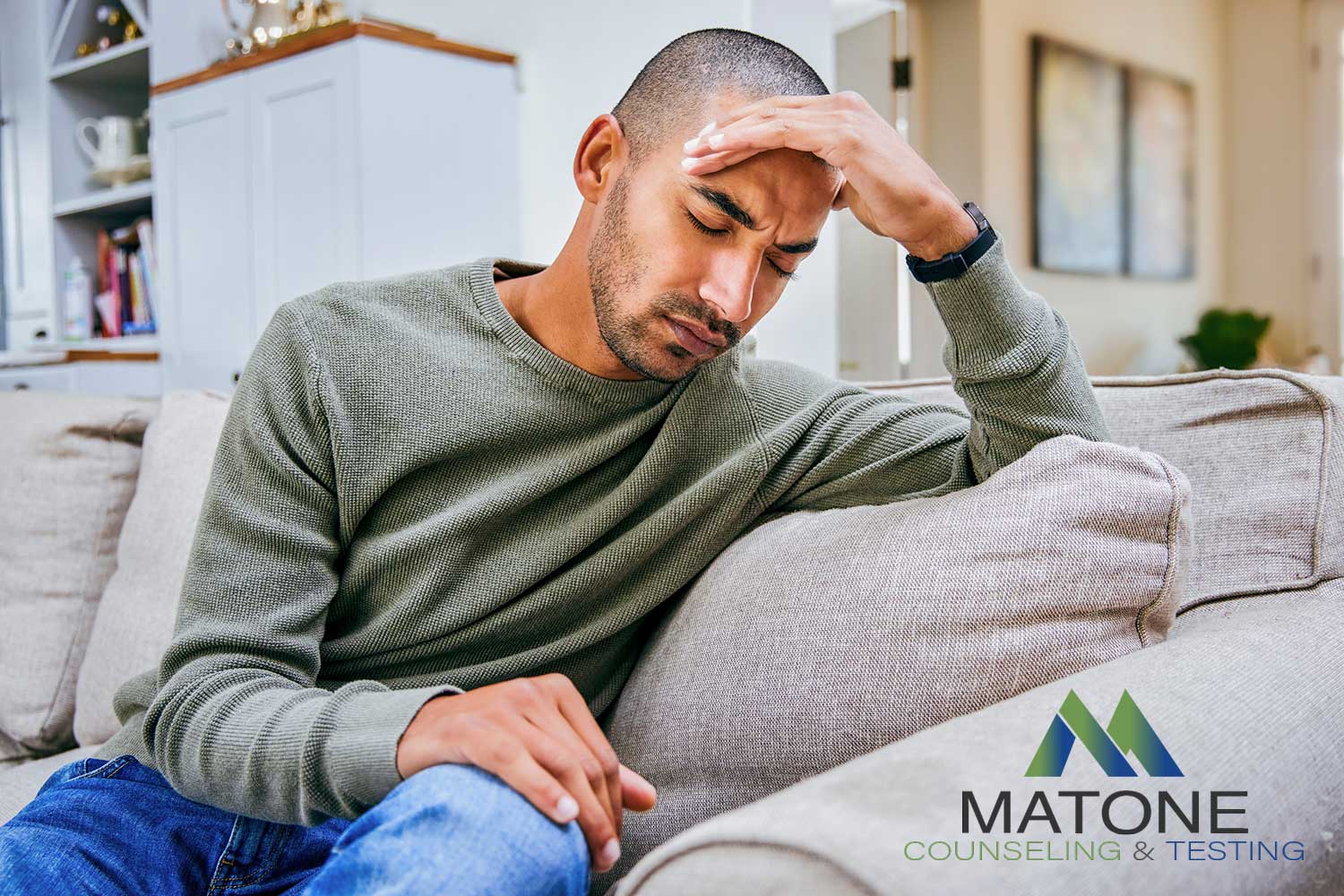Concussions and Mental Health:
Bridging the Gap
With the increase in sports-related concussions coming into the spotlight within the last decade, research has shifted into mapping out the complexities of how concussions have significant short and long-term impacts on the brain. One important highlight in the research is the effect that concussions can have on mental health. An important note of this brief article is not to discourage individuals from activities such as contact sports but to inform the importance of mental health treatment post-concussion.
Defining a concussion
Firstly, let’s start off by defining what a concussion exactly is. A concussion is a form of Mild Traumatic Brain Injury or mTBI where there is a disruption of brain function as a result of the whiplash effect of the brain due to outside impact to the skull (Gardner & Yaffe, 2015). The resulting damage that can be found from MRI or CT is in the tearing and stretching of brain tissue (Gardner & Yaffe, 2015). This is an international health concern that affects individuals from all walks of life with over 42 million individuals affected annually by concussions and in America alone the Centers for Disease Control and Prevention (CDC) has an estimated 1.6-3.8 million sports and recreation-related concussions occur each year (CDC, 2003). These numbers are believed to be skewed lower due to the underreporting/undertreating of concussions due to individuals perceiving the severity of their symptoms as “mild” (CDC, 2003). While concussions don’t discriminate, individuals involved in contact sports, military settings, and domestic violence are at a higher risk for repeated concussions (Haarbauer-Krupa, 2021). While more research is needed, it has been found that children can take twice as long to recover from concussion when compared to adults (Gornall et al, 2021). This is further compounded by data showing that one out of four children under the age of thirteen experience concussion symptoms past the one-month mark of expected recovery (Gornall et al, 2021).
Concussion symptoms
The symptom presentation of a concussion varies from person to person but can range from a mix of cognitive, psychiatric, and physical concerns (Sheldrake et al., 2022). These symptoms often resolve in the short term (2-3 weeks); however, long-term disabilities are noted in around 15% to 30% of individuals past one year of the initial concussion (Haarbauer-Krupa et al., 2021). These long-term debilitating symptoms have been grouped together and labeled as Post Concussion Syndrome (PCS) which groups the domains of cognitive, emotional, physical, and behavioral symptoms elicited by concussions under one diagnosis (Hiploylee et al., 2017). PCS can be difficult to diagnose due to the various different clinical definitions used by different organizations, confounding a precise diagnostic criterion.
A concussion or mTBI can be defined by the American Congress of Rehabilitation Medicine as a “disruption of brain function” that may include a loss of consciousness (less than 30 minutes), loss of memory, alteration of mental state, or focal neurological deficits (Head, 1993, p. 86). Below is a further list of symptoms that can present or continue after the initial injury causing damage to the brain past the one-month mark.
Persistent post-concussive symptoms include:
- Headaches: Called Posttraumatic Headaches that often feel like tension or migraine headaches.
- Dizziness
- Emotional regulation/liability and behavioral problems
- Anxiety and Depression
- Sleep disturbances: Insomnia and hypersomnia
- Reduced attention and processing speed.
- Ringing in the ears.
- Blurry vision.
- Noise and light sensitivity.
- Rarely, decreases in taste and smell.
- Increased suicide ideation
(Mayo Clinic, 2023; McInnes et al., 2017, p. 2; Fralick et al., 2019; & Seifert & Evans, 2010).
Concussion interplay with mental health:
Added research has shown that PCS can result in an increased risk of Major Depressive Disorder (MDD) and Post Traumatic Disorder (PTSD). With the common risk factor being the individual living with a pre-existing mental health disorder or concussion received by an act of assault or violence (Stein et al., 2019). Research conducted by Bryant et al., found that one year after a concussion, 23% of patients developed a new psychiatric disorder, most notably MDD and generalized anxiety disorder (Bryant et al., 2010). Another study by Haarbauer-Krupa et al., has found that individuals with a concussion are at double the risk of experiencing PTSD compared to individuals without a reported concussion (Haarbauer-Krupa et al., 2021). Other diagnoses pertaining to substance-use disorders, psychotic disorders, and other related anxiety disorders have been found in studies to have some association with concussions; however, there is a need for further examination of individuals with concussions in comparison to the general population (Haarbauer-Krupa et al., 2021).
Experiencing a concussion has also been found to exacerbate preexisting symptoms of depression and anxiety in both adults and children (Haarbauer-Krupa et al., 2021). When anxiety and depression symptoms are left untreated, this can greatly affect concussion recovery and the quality of life of an individual experiencing long-term PCS symptoms (Haarbauer-Krupa et al., 2021).
The interplay of cognitive changes, physical symptoms, and emotional distresses create a necessity for recovering from a concussion from a biopsychosocial orientation. This importance of interdisciplinary care for individuals with lasting concussion symptoms highlights the need for mental health interventions that target anxiety, depression, frustration tolerance, impulsive behavior, and incorporate a holistic view of the individual’s needs (Sheldrake et al., 2022).
Hopes for the future:
While concussions are not a new concept in our current day and age, the research is still novel and developing, particularly regarding interventions for PCS. There is a need for research on potential therapeutic options that can be molded to target the individual’s various symptomatic domains that present post-concussion. Another gap currently in the research is the need for more studies involving populations of children and the elderly (Sheldrake et al., 2022). Additionally, the awareness of mental health assessment, intervention, and prevention post-concussion is imperative to the standard care of children and adults post-injury (Gornall et al., 2021).
Seeking help:
Finding mental health counseling after a concussion can be difficult, especially with the few therapists that have experience working with individuals experiencing persistent concussions and brain injury symptoms. Fortunately, Matone Counseling & Testing can offer mental health services from providers with experience navigating therapy with individuals living with concussions and brain injuries. Feel free to reach out and schedule an appointment!
Luke is a Licensed Clinical Mental Health Counselor Associate and Clinical Rehabilitation Counselor in the state of North Carolina. He earned his Master’s Degree in Clinical Rehabilitation & Mental Health Counseling from The University of North Carolina at Chapel Hill with a dual specialization in psychiatric and developmental disorders. He also spent his time at Chapel Hill with a focus on working with individuals living with a Traumatic Brain Injury to navigate mental health and employment barriers. Luke is passionate about working with adults and teens (16+) who may be experiencing challenges with difficulty adjusting to new situations/disability, anxiety, depression, and trauma.

Written by: Luke Short, LCMHCA
Luke is a Licensed Clinical Mental Health Counselor Associate and Clinical Rehabilitation Counselor in North Carolina.
References
Bryant, R. A., O’Donnell, M. L., Creamer, M., McFarlane, A. C., Clark, C. R., & Silove, D. (2010). The psychiatric sequelae of traumatic injury. American Journal of Psychiatry, 167(3), 312–320. https://doi.org/10.1176/appi.ajp.2009.09050617
Centers for Disease Control and Prevention. (2003). Report to Congress on mild traumatic brain injury in the United States: Steps to prevent a serious public health problem. U.S. Department of Health and Human Services. https://www.cdc.gov/traumaticbraininjury/pdf/mtbireport-a.pdf
Fralick, M., Sy, E., Hassan, A., Burke, M. J., Mostofsky, E., & Karsies, T. (2019). Association of concussion with the risk of suicide: A systematic review and meta-analysis. JAMA Neurology, 76(2), 144–151. https://doi.org/10.1001/jamaneurol.2018.3487
Gornall, A., Takagi, M., Morawakage, T., Liu, X., & Anderson, V. (2021). Mental health after pediatric concussion: a systematic review and meta-analysis. British Journal of Sports Medicine, 55(18), 1048-1058.
Haarbauer-Krupa, J., Pugh, M. J., Prager, E. M., Harmon, N., Wolfe, J., & Yaffe, K. (2021). Epidemiology of chronic effects of traumatic brain injury. Journal of Neurotrauma. Published. https://doi.org/10.1089/neu.2021.0062
Head, J. (1993). Definition of mild traumatic brain injury. J Head Trauma Rehabil, 8(3), 86-7.
Hiploylee, C., Dufort, P. A., Davis, H. S., Wennberg, R. A., Tartaglia, M. C., Mikulis, D., Hazrati, L. N., & Tator, C. H. (2017). A longitudinal study of postconcussion syndrome: Not everyone recovers. Journal of Neurotrauma, 34(8), 1511–1523. https://doi.org/10.1089/neu.2016.4677
McInnes, K., Friesen, C. L., MacKenzie, D. E., Westwood, D. A., & Boe, S. G. (2017). Mild traumatic brain injury (mTBI) and chronic cognitive impairment: A scoping review. PloS One, 12(4), e0174847. https://doi.org/10.1371/journal.pone.0174847
Persistent post-concussive symptoms (Post-concussion syndrome) – Symptoms and causes – Mayo Clinic. (2023, January 18). Mayo Clinic. https://www.mayoclinic.org/diseases-conditions/post-concussion-syndrome/symptoms-causes/syc-20353352
Seifert, T. D., & Evans, R. W. (2010). Posttraumatic headache: A review. Current Pain and Headache Reports, 14(4), 292–298. https://doi.org/10.1007/s11916-010-0117-7
Sheldrake, E., Al-Hakeem, H., Lam, B., Goldstein, B. I., Wheeler, A. L., Burke, M., … & Scratch, S. E. (2022). Mental health outcomes across the lifespan in individuals with persistent post-concussion symptoms: A scoping review. Frontiers in neurology, 13, 850590.
Stein, M. B., Jain, S., Giacino, J. T., Levin, H., Dikmen, S., Nelson, L. D., Vassar, M. J., Okonkwo, D. O., Diaz-Arrastia, R., Robertson, C. S., Mukherjee, P., McCrea, M., Mac Donald, C. L., Yue, J. K., Yuh, E., Sun, X., Campbell-Sills, L., Temkin, N., Manley, G. T., TRACK-TBI Investigators, … Zafonte, R. (2019). Risk of posttraumatic stress disorder and major depression in civilian patients after mild traumatic brain injury: A TRACK-TBI study. JAMA Psychiatry, 76(3), 249–258. https://doi.org/10.1001/jamapsychiatry.2018.4288
[/fusion_text][/fusion_builder_column][/fusion_builder_row][/fusion_builder_container]




